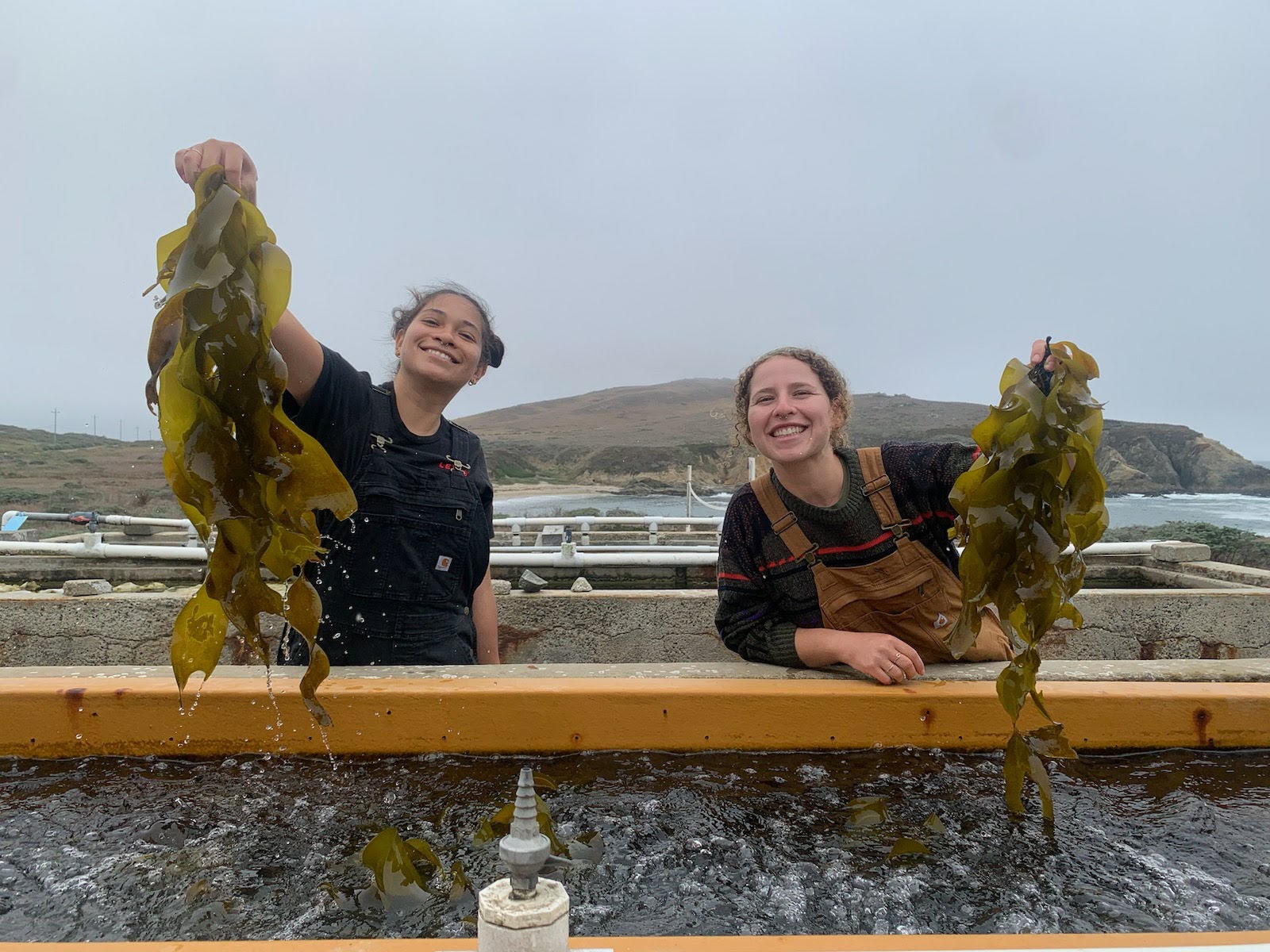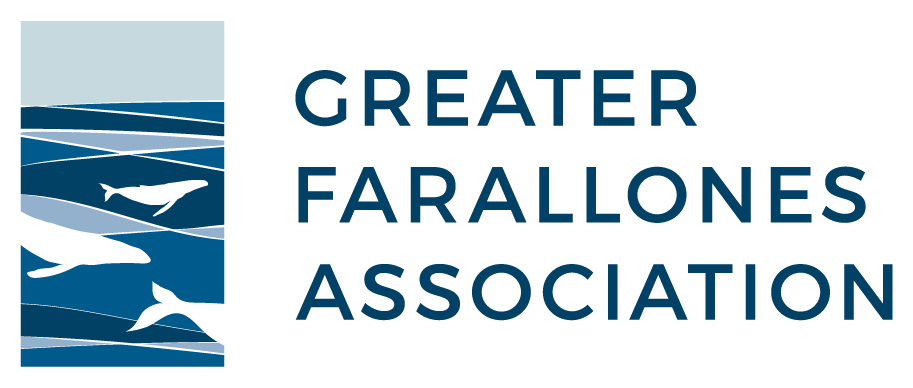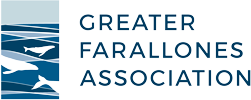Picture a Scientist: Julieta Gomez

Julieta Gomez (left) and Rachael Karm (right) show off strands of kelp at the Bodega Marine Lab.
Julieta Gomez is a Kelp Restoration Specialist at Greater Farallones Association, and an affiliate with Greater Farallones and Cordell Bank National Marine Sanctuaries. She is our resident kelp nursery caregiver. Chatting over tea, Julieta spilt the tea on what it’s like being a scientific diver, researcher, sea cucumber obsessed, fierce advocate in marine science.
As a child, Julieta went to the beach a lot! She loved the ocean but really didn’t know much about it. Her curiosity led her to volunteer at a local aquarium, where she got hands-on experience – literally! Immersed among the tanks filled with horn sharks, moray eels, and, her personal favorite, sea cucumbers, she became a science ambassador. Teaching Southern California tourists and locals about these fascinating creatures ignited her passion for ocean science and outreach.
Amidst the sea star wasting disease (SSWD) outbreak in 2014, Julieta observed infected sea stars in the aquarium, prompting her to delve deeper into marine science. This pivotal moment in ocean conservation peaked her interest in pursuing a career in marine science. She was admitted to the University of California, Santa Cruz (UCSC) as a Marine Biology major. Being the only student from her high school to attend UCSC that year, she experienced a large culture shock on campus, previously coming from a diverse community. The student population is and has historically consisted of predominantly white students. But this disconnect didn’t detract from her experience. Julieta quickly adapted and grew to love the vibe of Santa Cruz.
As a sophomore, she found her stride in marine field science while assisting a graduate student in measuring mussel bed depth along the coast to see how SSWD had impacted the mussel bed. This experience was particularly meaningful to her because it was the first time she engaged in field research and she was able to find answers to questions that had intrigued her since high school. Julieta’s journey as a researcher only blossomed from there.
She completed an REU (Research Experiences for Undergraduates) program with PISCO via the Raimondi Lab; participated in the STEM Diversity MARC (Maximizing Access to Research Careers) program; and conducted intertidal field work in Sitka, Alaska where she studied articulated coralline algae.
Entering Her SCUBA Era
Julieta is an accomplished scientific SCUBA diver and now dives as a regular part of her job. However, she wasn’t always as confident of a diver as she is now. She started her subtidal exploration with open water freediving as part of a field course at UCSC, which led her to get a SCUBA certification in Los Angeles. An open water scuba dive certification requires pool training sessions and two full days of ocean dives. During her pool sessions, she immediately found herself challenged and even hated it. Skills that came easily to her classmates, like controlling breath and mask related tasks, were difficult, leaving her frustrated and feeling isolated. Julieta felt further isolation from the other students who were learning to dive for extravagant vacations while she was getting certified to expand her future job opportunities. She persisted.
Giving subtidal ocean exploration another chance, she enrolled in an advanced SCUBA course at Aqua Safaris in Santa Cruz where she faced a new set of challenges such as not having a car and being slower to learn critical skills. Julieta befriended classmates to carpool with and sought the help of a course assistant to practice with and build her diving skills. Setting her ego aside, she was able to solidify her diving skills and move on to completing her Rescue Diver and Scientific Diving certifications. The rigorous courses took time but made her the diver she is today with the skills to dive on the challenging Northern California coast (and get paid to do so)!
Beyond UCSC
Julieta not only did academic and scientific research, she conducted live webinars with other Latino colleagues where they shared ocean facts in both English and Spanish. She appreciated being able to strengthen her scientific vocabulary in Spanish and learn different dialects from her colleagues. She was able to find her own community within the sciences and forge who she is as a scientist.
After facing rejection from graduate school, Julieta decided to take time away from school, moved back to Los Angeles, and worked on acquiring essential skills, took a brief detour into guest services at Aquarium of the Pacific. But she eventually found her way back to marine science. Julieta learned all of her research experience couldn’t get her a job in marine science without having a driver’s license and car, so she quickly remedied that and obtained a job in Santa Monica at Heal the Bay as a Public Programs Associate.
Julieta loved being a Public Programs Associate at Heal the Bay, a small aquarium where she was able to engage visitors of many ages in marine education. Her favorite memories include 2-year-olds running amok in the aquarium, kids feeding the invertebrates, and doing outreach on the Santa Monica Pier. Julieta felt accomplished being “on the other side of the tortilla” going from a high school volunteer to an engaging marine science educator sharing all her earned knowledge.
A turning point in Julieta’s career came when she learned about a professor at Sonoma State University seeking a student with SCUBA diving skills for kelp-related work. Even though she was still set on working in the intertidal, she decided to approach this opportunity with an open mind. Her initial conversation with Dr. Brent Hughes was a success, inspiring her to reapply to graduate school to study bull kelp and its interactions with SSWD for the fall of 2020. She saw all of her past challenges leading her to Sonoma State.
The “Plumber” Era
Collaborating with fellow lab mate Rachael Karm, Julieta studied the bull kelp decline among a group of scientists spearheading a new effort diving on the Sonoma Coast to conduct subtidal surveys related to kelp restoration. The duo’s efforts included collecting kelp on boogie boards, sliding down sand dunes, building water tables, growing kelp in a lab with a myriad of challenges, engaging with the communities that rely on kelp forest ecosystems, and creating a network for kelp cultivation across California.
In her current role as a Kelp Restoration Specialist at Greater Farallones, Julieta embraces her “plumber era,” where her days can consist of trips to the hardware store to buy pipes or troubleshooting kelp tank setups at the Bodega Marine Lab in Bodega Bay. She loves learning new skills that are commonly associated with plumbers, engineers, or electricians. She’s constantly thinking, “how can we make sure this kelp grows hella good.” Despite challenges, she remains optimistic about closing the loop of kelp growth and restoration.
Take Away
Recognizing the need for diverse voices in marine science, Julieta emphasizes the importance of programs for underrepresented students. Being a young woman of color, she has had to prove herself to fellow scientists, divers, anglers, and more. However, she has overcome challenges and has even had the opportunity to serve as a cruise leader for field monitoring in Drakes Bay. Julieta advocates for making scuba diving more accessible and applauds initiatives like Angel City Divers (@angelcitydivers), which prioritize affordability and inclusivity for aspiring BIPOC divers.
Her advice to all those considering potential opportunities echoes her own journey: “Just do it. Don’t say no before applying. Even without a car, with a supportive community, anything is possible.” Julieta’s story exemplifies resilience, passion, and the transformative power of embracing opportunities in the pursuit of one’s dreams.
Learn More
Greater Farallones Kelp Restoration Project: Greater Farallones Association, Greater Farallones National Marine Sanctuary

